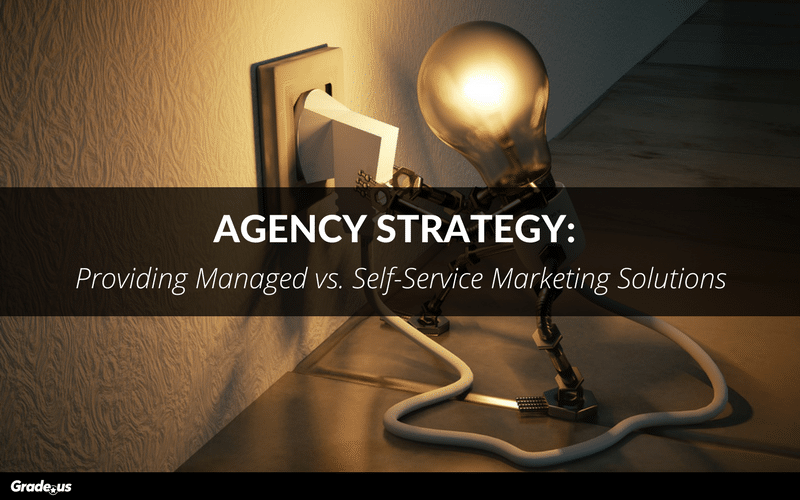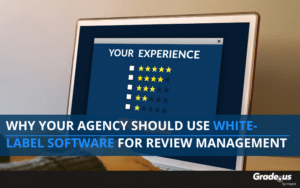Your clients are desperate.
They just don't know it yet. Most won't realize they are, until it's too late. It's a common but unfortunate part of self-service marketing. Small business owners aren't as focused on review management as they should be.
Until they're flooded with negative reviews.
At that point, they're frantically looking for an agency to dig them out of the hole they've fallen into. This makes them vulnerable.
Small business owners live by a dangerous motto
The squeaky wheel gets the grease.
Remember that saying? It's not as if small business owners repeat this mantra to themselves over and over. But it is a motto they live by. Because they have to.
They spend their time running from one fire to the next.
In the beginning, small business owners are on their own. They're responsible for sales and marketing, customer service and support, strategy and planning - all of it.
They're forced to wear many hats.
When it comes to self-service marketing, these small business owners are exhausted, underpaid, overworked and hanging on by a thread. Most of the time they're doing everything they can to keep the lights on and their doors open.
This is the environment your agency needs to operate in.
Clients need your help to carry their burdens
They need you to demonstrate your value quickly. That's important because business owners are typically surrounded by takers. People who want to take their...
- Time in the form of advice, mentorship, free training and support
- Money which disrupts their precious but often unstable cash flow
- Important resources (e.g. connections, access, mentors, ideas) to use for themselves
Prospective clients will use filters to determine whether you're a...
1. Taker that's focused on extracting maximum value out of their business without contributing anything of value in return.
2. Giver that's focused on relieving their burdens, helping them to grow and providing value in return.
This is the answer to the managed vs. self-service marketing question. But it's only half of the equation. You'll need to have a clear idea of two things.
1. What do you want your agency to offer?
2. What does your client want from you?
These seem like simple questions, don't they? But there's actually a more going on here than meets the eye.
1. What do you want your agency to offer?
This question requires that you set some boundaries. Are you willing to fight in the trenches for your clients, to handle the day-to-day grind that comes with online review management?
You'll have to respond to reviews on behalf of your clients. Deal with a consistent stream of negative feedback and unhappy customers. Strategize with your clients to build a comprehensive and balanced review portfolio.
Does that sound appealing?
With managed services, you're able to charge more but it comes with a potential downside. Left unchecked, your expenses may grow with your revenue. If clients reward you with more business, you may need to spend more on their campaigns. You might also need more staff to accommodate managing your clients' needs.
Revenue isn't profit.
If you go the managed services route, you'll need to have strict financial controls over your profit margins and sales incentives. It's the only way you'll be able to ensure your business stays healthy.
If company revenues grow at twice the rate of profits for more than three years, watch out! If you're planning on offering managed services, make sure your agency prioritizes profits over straight revenue.
Make sure you're paid well.
2. What does your client want from you?
Small business owners also have needs of their own. If they have the budget and you can demonstrate your value quickly, they may go for managed marketing services.
What if they don't have the budget?
They'll take a different route, choosing between either (a.) the platform and self-service marketing services you provide or (b.) they'll stick with the status quo and do nothing.
Most clients won't admit they don't have the money.
So, they'll behave evasively. They'll offer vague answers, ghost you mid-conversation or simply decline.
Regardless of the option they choose, your clients will have expectations.
· Your self-service marketing clients will expect you to be available when they call for help. They'll expect a low(er) price point and assistance with minor (or not so minor) problems as they appear. You'll need to spend a lot of time educating clients (for free) if you plan on minimizing churn.
· Your managed clients will expect you to "just take care of it." If you've done your job well they'll trust you to handle the minutiae of their ORM campaigns. They'll have a list of fuzzy, implicit and unrealistic expectations that need to be handled upfront. If they're hit with a barrage of negative reviews they'll expect you to simply handle it.
Here's where things get tricky.
You'll run into clients who expect you to provide both. Your managed clients may feel the need to meddle with things a bit, to get more involved in their campaign than they should be.
It gets better.
Your self-service marketing clients may demand that you manage key aspects of their campaign, with the expectation that you provide full-service support for free.
You'll need a plan to handle these situations.
The best option for you is...
Pretty obvious. It's the solution that meets your needs and your client's needs.
We've already covered the expectations of managed and self-service marketing but what about the pros and cons? Are there any compelling benefits to choosing one option over the other?
Absolutely.
Managed ORM services
Pros
- Pays much more than self-service marketing
- Tremendous responsibility for the outcome of a client’s review portfolio
- You have more control over a client’s review profile
- Able to respond to negative reviewers directly
- Can down sell/cross sell to a self-service option, offloading routine aspects of a client’s campaign
Cons
- Expenses increase with revenue if profit margins remain unprotected
- Discounts, incentives and loss leaders have a tremendous negative impact on profit margins
- Client expectations are centered around your efforts, whether you’re responsible for them or not
- Client expectations must be managed consistently to preserve the relationship
Self-service ORM services
Pros
- Consistent cash flow if churn is kept to a minimum
- Minimal involvement with client campaigns
- No responsibility for the outcome of a client’s review portfolio
- Can upsell self-service clients to a managed service
- Self-service marketing is scalable as long as your systems and platform are stable
Cons
- Customer churn is a considerable problem if your value proposition is weak
- Clients may expect managed services at a self-service price
- Consistent marketing is a requirement to avoid erosion due to customer churn
- If you go it alone, you’ll need to invest a considerable amount to maintain your infrastructure/platform
Whew!
This is a lot to cover isn't it?
How do you go about implementing these options well? Is there a way to increase the pros of one option while simultaneously minimizing the cons?
Sure.
It's fairly straightforward.
Use both models to minimize downsides
When you use both models you minimize the downsides of either option. As far as a solution goes, it's a fantastic way to serve clients, boost profitability and grow your agency.
Here's how it works.
If you're a self-service marketing firm...
You provide your clients with everything they need to manage their own ORM campaigns. As I mentioned before, there's minimal involvement or risk on your part. You're offering a self-service solution.
But, you offer a managed service option as an upsell.
The clients who want to go it alone - they have the tools, resources and knowledge base they need to do so. They're able to save money, working with a stable platform that has everything they need.
At some point, customers will make an unpleasant realization.
They're not getting the results they want.
So, you offer your managed option as a paid upgrade to the clients with a desire to grow. Clients expecting managed services at a self-service price? A managed services upgrade trains them, right from the beginning, to expect otherwise.
Here's the beauty of this strategy.
It works to reduce customer churn. If clients are working with you in a self-service and managed capacity they're less likely to leave, reducing churn. As an added bonus, this upsell also gives you the much needed cash you need to maintain your infrastructure/platform (if you choose to go it alone).
If you're a managed services provider...
The self-service marketing option is an effective down sell you can use in a variety of innovative ways.
You can...
- Use it to offload routine work clients feel nickel and dimed for
- Strengthen your value proposition by offering a solution your competitors don’t have
- Win clients over, using your platform as a compelling bargaining chip (e.g. discounts, bonuses and incentives)
- Supplement your revenue with pure profit and consistent cash flow from your self-service solution
- Offer clients free trials and innovative offers
- Upsell clients to premium self-service marketing options as their organization grows over time
The possibilities are endless!
As we've seen, one option isn't better than the other. It's simply about meeting the needs of your business and your client. Combining both options maximizes flexibility, if it's handled well.
Just one problem.
Self-service marketing requires a platform
Which, if you're like most people, you don't have. That's bad news because self-service marketing is scalable so long as your systems and platform are stable.
Not really doable if you don't have a platform of your own.
This would be a disaster, if you were out of options. The good news? White labeling gives you the opportunity to use someone else's platform to build your business.
But, only if you choose the right platform.
White labeling is a bad idea if you don't have the flexibility and privacy you need. The feature set needs to be comprehensive, the privacy clear cut.
With Grade.us, agencies are able to white label both managed and self-service marketing options.
Savvy platforms (like Grade.us 😉 offer a free version of white labeling for managed service providers that covers everything except the actual dashboard. If your agency offers managed online review services, you could use your agency brand and custom url for the review funnel, email notifications, etc.
Give your customers the best of both worlds
Your clients are desperate.
But they don't know it yet. Most won't take action on their review portfolio until it's too late. Small business owners aren't as focused on review management as they should be.
It's not their fault.
Small business owners spend their time running from one fire to the next.
These small business owners are on their own. In the beginning, they're responsible for sales and marketing, customer service and support, strategy and planning - all of it.
Survival requires that they wear multiple hats.
Clients need your help to carry their burdens. They want an answer to the question - are you a giver or a taker? These options give your agency flexibility, a chance to relieve their fear and stress. With the right approach you'll have everything you need to relieve your client's desperation.
About the Author
Andrew McDermott
Andrew McDermott is the co-founder of HooktoWin. He shows entrepreneurs how to attract and win new customers.









